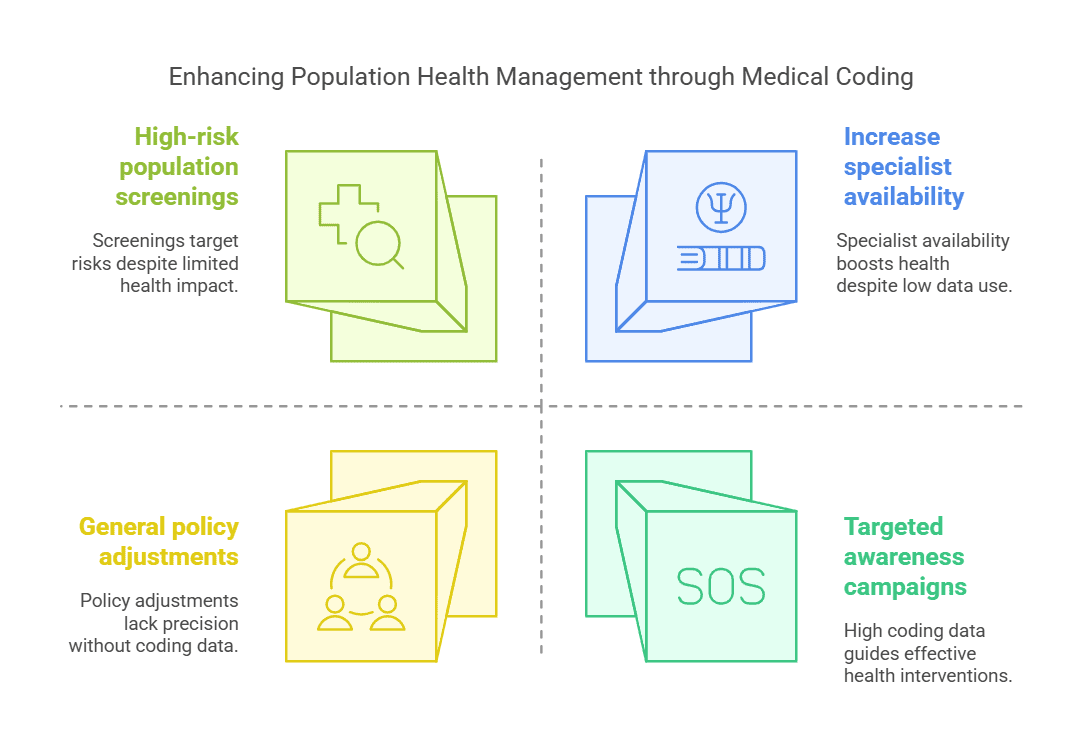On-Demand Outsourcing BPO Services for Healthcare Providers With 24/7 Coverage!
Save up to 70% on staffing costs!
Browse Specialty Staffing ServicesIn What Ways Does Medical Coding Support Evidence-Based Decision-Making in Healthcare?

Medical coding might seem like a behind-the-scenes process, but it’s actually a powerhouse when it comes to supporting evidence-based decision-making in healthcare. Every diagnosis, treatment, and procedure is turned into standardized codes, which are then used for everything from patient care analysis to hospital policy improvements. Let’s break it down into real-world terms and see why accurate medical coding is essential for better decision-making in healthcare.
Key Takeaways:
✅ Medical coding transforms healthcare data into structured, standardized information, making it easier to support better decision-making.
✅ Additionally, tracking patient outcomes, measuring treatment effectiveness, and identifying healthcare trends become more efficient.
✅ Codified data also plays a crucial role in research, resource allocation, and reimbursement processes, ensuring accuracy and efficiency.
✅ As a result, providers benefit from improved healthcare quality and stronger financial health.
The Role of Medical Coding in Healthcare Decision-Making
1️⃣ Turning Raw Data into Usable Insights
Imagine a hospital treating hundreds of patients daily. Without a standardized system, tracking what works (and what doesn’t) would be chaos. Medical coding converts all treatments, diagnoses, and outcomes into uniform data points. This structured data is then used to analyze treatment success rates, disease trends, and patient demographics—helping doctors and administrators make informed choices.
2️⃣ Supporting Clinical Research & Public Health Initiatives
Medical researchers rely on vast amounts of patient data to study diseases, test new treatments, and improve care guidelines. With accurate medical coding, they can identify patterns in disease outbreaks, measure the effectiveness of new drugs or procedures, and conduct epidemiological studies that shape public health policies. For instance, during the COVID-19 pandemic, medical coding played a crucial role in tracking cases, hospitalizations, and mortality rates. As a result, healthcare organizations and governments were able to respond more effectively by allocating resources, implementing safety measures, and developing targeted treatment strategies.
3️⃣ Ensuring Quality of Care & Performance Benchmarking
Healthcare providers are always striving to improve patient outcomes. By analyzing medical coding data, hospitals can:
✔ Compare treatment outcomes across different facilities.
✔ Identify areas needing improvement (e.g., high readmission rates).
✔ Develop evidence-based protocols to improve efficiency.
Let’s say a hospital notices a high number of complications after a specific surgery. By analyzing coded data, they can pinpoint whether it’s due to a surgical technique, post-op care, or patient demographics—and take steps to improve care.
4️⃣ Streamlining Insurance & Reimbursement Processes
Accurate coding ensures that hospitals and providers get paid correctly and fairly by insurance companies. But it’s more than just billing—proper documentation and coding also help:
✔ Reduce claim denials and financial losses.
✔ Justify necessary treatments with clear evidence.
✔ Prevent fraud by ensuring transparency in medical billing.
5️⃣ Enhancing Population Health Management
Government agencies and healthcare organizations use coding data to assess community health trends and allocate resources accordingly. This helps with:
✔ Preventive care strategies (e.g., targeting high-risk populations for screenings).
✔ Chronic disease management programs.
✔ Public health policy adjustments based on real-time data.
For example, if medical coding data reveals a spike in diabetes cases in a certain region, healthcare leaders can introduce targeted awareness campaigns or increase specialist availability.
What Did We Learn?
Medical coding is more than just a tool for billing—it’s the backbone of evidence-based decision-making in healthcare. Not only does it improve patient care, but it also plays a key role in shaping public health strategies. By ensuring accuracy, properly coded data gives healthcare professionals, researchers, and policymakers the right information to make informed choices.
FAQs
Why is medical coding important for decision-making in hospitals?
Medical coding provides structured data that helps hospitals track treatments, assess patient outcomes, and identify areas for improvement. As a result, healthcare providers can make better, evidence-based decisions that enhance overall patient care.
How does medical coding impact patient care?
By organizing medical data systematically, coding allows healthcare providers to analyze past cases, measure treatment success rates, and refine care protocols. Consequently, this leads to improved patient safety and more effective treatment plans.
Can medical coding help in preventing fraud?
Yes! Proper coding ensures billing accuracy, which not only reduces fraudulent claims but also minimizes financial losses. Furthermore, it promotes transparency in medical billing and reimbursement processes.
How does medical coding support medical research?
Researchers rely on coded patient data to identify disease trends, measure treatment effectiveness, and develop new therapies. Moreover, this real-world evidence helps shape clinical guidelines and advance medical innovations.
Disclaimer
For informational purposes only; not applicable to specific situations.
For tailored support and professional services,
please contact Staffingly, Inc. at (800) 489-5877
Email : support@staffingly.com.
About This Blog : This Blog is brought to you by Staffingly, Inc., a trusted name in healthcare outsourcing. The team of skilled healthcare specialists and content creators is dedicated to improving the quality and efficiency of healthcare services. The team passionate about sharing knowledge through insightful articles, blogs, and other educational resources.
 Book a Demo to Build Your Team Today!
Book a Demo to Build Your Team Today!
 Read Case Studies
Read Case Studies 



 Virtual Medical Assistants
Virtual Medical Assistants



